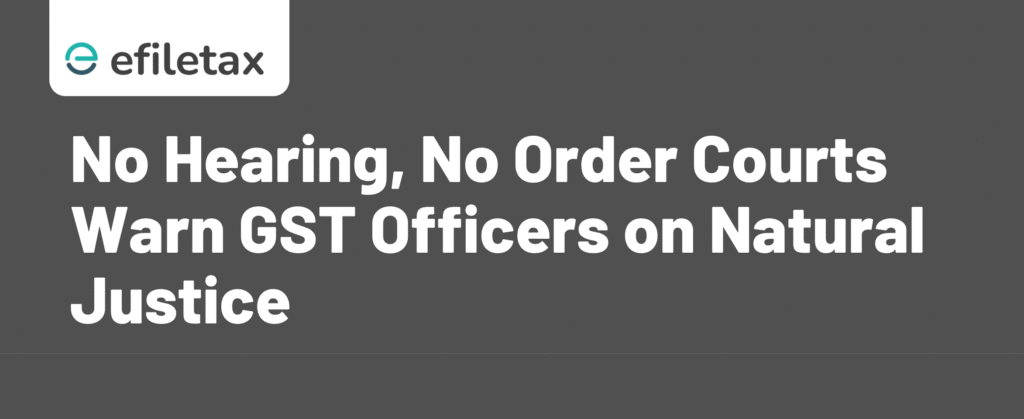
Introduction
Demand order invalid without hearing—this legal principle is crucial for every taxpayer and consultant to know. Whether under GST or Income Tax laws, authorities cannot arbitrarily pass demand orders without considering the taxpayer’s reply or giving them a fair opportunity of hearing. Ignoring this principle can render the entire demand legally void.
Why Proper Hearing Is a Legal Right
The right to a fair hearing is not just a formality. It’s a constitutional protection under Article 14 (equality before law) and Article 21 (right to life and personal liberty). Both the Income Tax Act and GST Act incorporate this principle through specific provisions:
- CGST Act, 2017 – Section 75(4): Requires proper officer to provide an opportunity of hearing before passing any adverse order.
Recent Judicial Stand: A Wake-up Call for Tax Officers
Case Law Highlight – Allahabad High Court
📌 M/s Varun Beverages Ltd. vs. State of UP (2024)
Key observation: “Mechanical issuance of demand without dealing with the reply is a breach of natural justice.”
Other Rulings:
- Madras HC in Tvl. Meenakshi Traders (2022): Reiterated that ignoring replies violates Section 75(4) of the CGST Act.
What Makes a Demand Order Legally Invalid?
A demand order can be challenged if any of the following are true:
| Condition Violated | Implication |
|---|---|
| Reply not considered | Violation of natural justice |
| Hearing not granted (despite request) | Breach of statutory obligation |
| Summary order passed without reason | Arbitrary action, liable to be set aside |
| Evidence submitted not discussed | Non-application of mind by officer |
How Taxpayers Can Respond
Here’s a step-by-step guide to handle improper demand orders:
- File a detailed reply on the GST portal or income tax e-proceedings tab.
- Request a personal hearing under relevant sections.
- If the officer still passes an order without considering your reply:
- File an appeal within the stipulated time (GST: 3 months, IT: 30 days).
- Attach all submitted replies and proofs.
- Cite relevant case laws (like Varun Beverages).
- If appeal is not possible, file a writ petition under Article 226 before the High Court.
Expert View: Don’t Let Silence Be Taken as Acceptance
CA Raghav Bhatia, GST litigation expert:
“Even if your reply was submitted online and ignored, it holds legal value. Document every communication. If hearing was denied, courts are inclined to quash such orders.”
Government Clarification and Safeguards
Similarly, CBDT in various instructions has warned officers against non-speaking orders—those which don’t address the taxpayer’s contentions.
Summary
A demand order issued without considering the taxpayer’s reply or granting a hearing is legally invalid. Both GST and Income Tax laws require tax officers to follow due process under principles of natural justice and statutory provisions.
Frequently Asked Questions (FAQ)
Q1. Is a demand order valid if my reply was not discussed?
No, such orders violate natural justice and can be challenged in appeal or writ.
Q2. Can I request a personal hearing?
Yes, under Section 75(4) of CGST Act and various IT provisions, hearings are mandatory if requested.
Q3. What if the officer ignores evidence I uploaded?
File an appeal/writ with documentation of your evidence. Courts have quashed orders passed without application of mind.
Conclusion
At Efiletax, we help you protect your legal rights and respond strategically to improper demand notices. Whether it’s drafting replies, filing appeals, or handling litigation—our experts are here to assist.